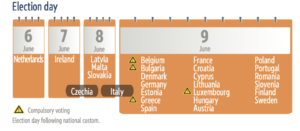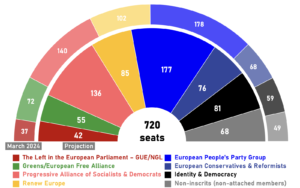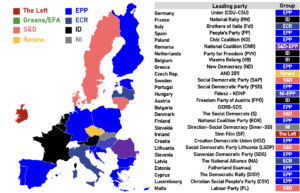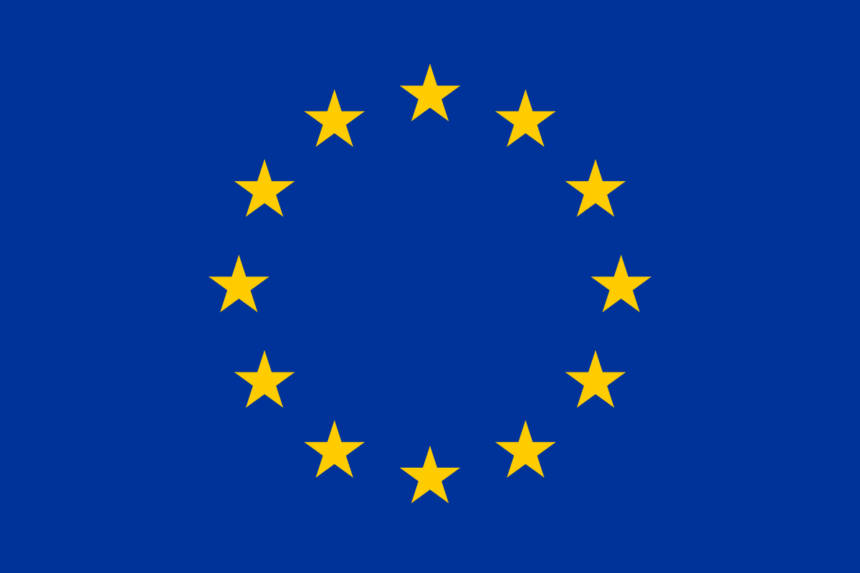
Mafalda Leão Aguiar is a professional in European politics and policy with a Bachelor’s in Political Science and International Relations from the Catholic University of Portugal and a Double Master’s in European Studies and Democracy from the same university and Jagiellonian University in Krakow. As a Schuman Trainee at the European Parliament in Brussels, she enhanced transparency and lobbying regulation, monitored the EU Transparency Register, and supported committee hearings on integrity and foreign interference. Currently, Mafalda is the European Policy Manager for a Brussels-based trade association in Digital Security, Cybersecurity, and Cyber Resilience. She navigates EU legislation, crafts position and white papers, and provides insights on key legislation like the European Cyber Resilience Act and the Artificial Intelligence Act.
When and What Are the European Elections?
The 2024 European elections are scheduled to take place from Thursday to Sunday, June 6-9, 2024, varying depending on each EU country’s national customs. These elections, held every five years, will allow EU citizens to elect 720 Members of the European Parliament (MEPs), marking an increase of 15 from the previous legislative term (2019-2024). Notably, the European Parliament stands as the world’s only directly elected transnational assembly, with MEPs representing the interests of EU citizens at the European level, organized into seven political groups based on their political affiliations rather than nationality.

At a glance: infographic, European Parliamentary Research Service, April 2024.
Significance of the European Elections
The outcome of this election will significantly shape the EU’s trajectory and influence its global partnerships over the next five years. It will impact geopolitics and shape policies ranging from climate change and migration to greater integration or increased nationalism. The European Parliament plays a crucial role in adopting and amending legislation alongside the Council of the EU. It also supervises EU institutions, agencies, bodies, and other entities, and approves the EU annual budget, which for 2024 includes €189.4 billion in commitments and €142.6 billion in payments. Furthermore, the European Parliament is responsible for electing the President of the European Commission, appointing its Commissioners, and holding them accountable.
Increased Voter Engagement and Awareness
The European Parliament’s Spring 2024 Eurobarometer indicates a notable increase in interest, awareness, and likelihood to vote in the upcoming elections compared to the last survey conducted in autumn 2023. Findings from the Spring 2024 Eurobarometer reveal that 81% of EU citizens acknowledge the heightened importance of voting in the 2024 European elections within the current geopolitical context.
Projected Composition of the Next European Parliament
According to a March 2024 Ipsos for Euronews survey, the Identity & Democracy group (ID, Far-right) is expected to significantly strengthen, securing an estimated 81 MEPs compared to the 59 MEPs, it held as of March 2024. Contrarily, the Renew group (Liberals and Centrists) is projected to decrease significantly from 102 MEPs to 85 MEPs, it held as of March 2024. Similarly, the European Conservatives & Reformists group (ECR, Eurosceptic Conservatives) are anticipated to experience a slight increase from 68 MEPs to 76 MEPs. The Greens/European Free Alliance group (Greens/EFA, Ecologists and Regionalists) may see a reduction from 72 MEPs to 55 MEPs. The European People’s Party (EPP, Christian Democrats and Conservatives) and the Socialists & Democrats (S&D, Social Democrats and Socialists) are expected to maintain their positions with EPP decreasing from 178 MEPs to 177 MEPs and S&D declining from 140 MEPs to 136 MEPs. The Left group (GUE/NGL, Radical Left and Communists) might see a slight increase from 37 MEPs to 42 MEPs. Non-attached members (MEPs who do not belong to one of the seven recognized political groups) are projected to increase from 49, as of March 2024, to 68 MEPs.

Projected composition of the next European Parliament, from Ipsos for Euronews survey on European election survey, March 2024.
Leading Parties by EU Country
According to the Ipsos for Euronews survey predictions, the EPP group is expected to lead in terms of seats in 12 out of 27 EU countries, including Germany, Spain, and Poland. The S&D group, though second in overall number of MEPs, would only dominate in 4 countries, notably in Northern Europe. The ID group is also projected to lead in four countries, including France. The ECR group may come first in two countries, one of them being most likely Italy. Renew and The Left are each anticipated to lead in one country – Czech Republic and Ireland, respectively – with the Greens/EFA group not leading in any.

Projections of the leading political party by country for the European Elections of 2024, from Ipsos for Euronews survey on European election survey, March 2024.
Evolving Political Landscape
The Ipsos for Euronews survey highlights several key trends:
- Rise of the Radical Right: The radical right is projected to make substantial gains in the European Parliament, potentially exceeding one-fifth of MEPs for the first time. However, their influence and extent of increase will vary across EU countries.
- Historical Shifts and the Decline of Traditional Parties: Over the past two decades, the presence of MEPs from right-wing Eurosceptic and far-right groups has increased markedly. These groups accounted for just 8.7% of all MEPs 20 years ago, but this figure grew to 11.8% in 2009, 15.7% in 2014, and 18% in 2019 elections. The Ipsos for Euronews projection suggest that, for the first time, these groups could represent more than a fifth (21.8%) of the European Parliament’s members in 2024. In contrast, traditional parties like the EPP and S&D have seen a decline. The EPP, which held 36.6% of the MEPs in 2004, is anticipated to drop to 24.6% after this June elections. Similarly, S&D are projected to decrease from 27.3% to 18.9% of the seats over the same period. These shifts reflect broader changes in the political landscape of the EU, with newer, more radical voices gaining ground while traditional powers wane.
- Uncertainties Ahead: The attitudes and positions of non-attached MEPs and potential changes among the political groups post-election introduce uncertainties.
Future Prospects and Glimpses of Hope
Despite these shifts and challenges, the European Parliament remains a beacon of democracy for many, reflecting the diverse political landscape of the EU. The increased engagement and participation of citizens in the 2024 elections signal a hopeful future where their voices will shape the direction of the European Union.
When to Expect Election Results?
Member States cannot release election results until polls close in the last voting country on Sunday, June 9, 2024. Live national results and seat projections will begin after 18:00 GMT+2, with the first aggregated projection of the European Parliament’s composition expected shortly after 20:15 GMT+2. For more detailed results, visit results.elections.europa.eu.

